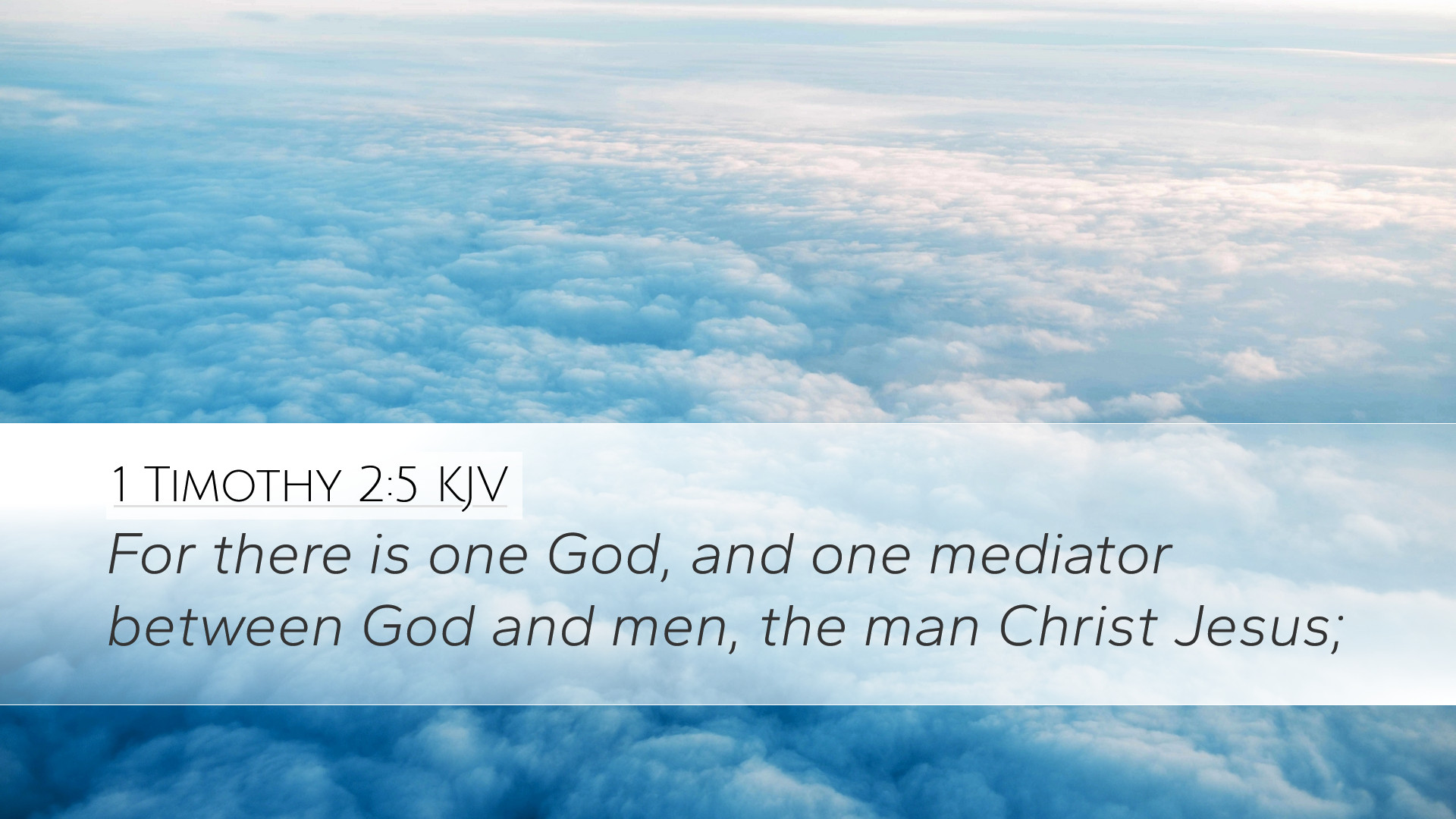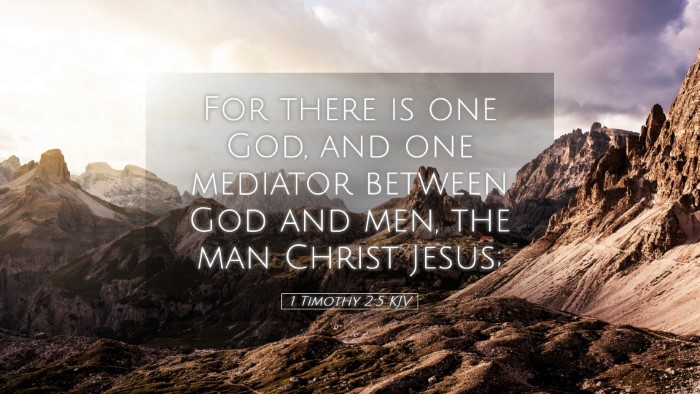Old Testament
Genesis Exodus Leviticus Numbers Deuteronomy Joshua Judges Ruth 1 Samuel 2 Samuel 1 Kings 2 Kings 1 Chronicles 2 Chronicles Ezra Nehemiah Esther Job Psalms Proverbs Ecclesiastes Song of Solomon Isaiah Jeremiah Lamentations Ezekiel Daniel Hosea Joel Amos Obadiah Jonah Micah Nahum Habakkuk Zephaniah Haggai Zechariah Malachi1 Timothy 2:5
1 Timothy 2:5 KJV
For there is one God, and one mediator between God and men, the man Christ Jesus;
1 Timothy 2:5 Bible Commentary
Commentary on 1 Timothy 2:5
Verse Text: "For there is one God, and one mediator between God and men, the man Christ Jesus."
Introduction
This verse encapsulates the foundational Christian doctrine of the mediatory role of Jesus Christ. It emphasizes the unique position of Christ as the sole mediator, which is a critical teaching found throughout the New Testament. The theological implications of this verse are vast and profoundly relevant for understanding the Christian faith.
Theological Insights
1. The Nature of God
Matthew Henry expounds on the assertion that "there is one God." This statement is central since it sets the foundation for the existence of a singular divine authority. This is in stark contrast to polytheistic beliefs that existed at the time and still persist today. The unity of God not only affirms monotheism but also underscores His sovereignty and singularity in salvation.
2. The Role of the Mediator
Albert Barnes notes that the term "mediator" is used to indicate someone who brings about reconciliation between two parties. The New Testament illustrates this role profoundly through Jesus' sacrifice. Clarke extends this explanation by asserting that mediation implies a legal status; Jesus bridges the chasm between sinful humanity and a holy God.
3. The Humanity of Christ
Notably, the phrase "the man Christ Jesus" emphasizes His humanity. Both Clarke and Henry highlight this duality of Christ being fully divine and fully human. It is paramount that, as a mediator, Jesus understands human experience and suffering, which allows Him to intercede for mankind effectively.
Exegesis of the Verse
In exploring the grammatical structure of this verse, it is clear that Paul is affirmatively teaching young Timothy about the distinctive Christian belief in the singularity of the mediator. Paul’s intent is to instruct the church in Ephesus regarding proper prayers and intercessions, ensuring that they recognize the authority and necessity of Christ in all matters of faith and supplication.
The Unity of God
- Rationale: The declaration of one God is reinforced by the Old Testament (Deut. 6:4) and serves as a reminder to the believers of their roots and covenantal faith.
- Application: Believers today are encouraged to reassess their understanding of God's uniqueness and his call for devotion to Him alone.
The Mediatorial Role of Christ
- Legal and Spiritual Implications: Christ’s role offers believers assurance that their relationship with God is restored, providing a profound sense of peace and fellowship.
- Intercession: His mediatorship emphasizes the ongoing nature of intercession, wherein Christ continually represents humanity before God’s throne.
Human Experiences
- Empathy and Understanding: The humanity of Christ allows for a unique connection with human struggles, as He Himself experienced temptation and suffering.
- Source of Strength: For believers, this empathy serves as a comfort, knowing that their mediator is not distant but intimately acquainted with their trials.
Practical Applications for Today
From a pastoral perspective, understanding Jesus as the sole mediator between God and humanity should impact how preaching, teaching, and counseling are conducted. Pastors are urged to emphasize Christ's unique role to cultivate a proper view of salvation among congregants.
- Evangelism: As a mediator, Christ becomes the focal point in evangelistic efforts, drawing attention to His life, death, and resurrection.
- Prayer Life: Believers are reminded that all prayers should be directed through Christ, reinforcing the notion of dependence on His intercessory work.
- Community of Faith: The church community should celebrate the mediatory work of Christ, fostering a culture of grace and reconciliation among members.
Conclusion
1 Timothy 2:5 is a profound declaration of Christian doctrine, emphasizing the exclusive mediatory role of Jesus Christ between God and humanity. Its implications stretch beyond theological musings and enter into the practical aspects of faith, guiding believers toward a deeper understanding of God's nature and Christ’s work in salvation. By studying this text within the framework of sound theology and historical context, pastors, students, theologians, and scholars can enrich their understanding and communication of the Gospel.


